During a recent lunch date with my mother, who is 98, she admitted to a growing sense of vulnerability. Her memory was fading and she had difficulty finding the words she needed. This loss of self, she admitted, was a cruel penalty for having a long life. Stunned by her candor, I didn’t know how to comfort her. The best I could do was remind her that at any age, we should value the present without longing for the past or anticipating the future.
Mine was a hollow answer. No words exist that can console someone experiencing memory loss, someone who is bit by bit saying goodbye to his or her history. I decided to console myself, instead. That my mother had the ability to evaluate her decline was a good thing, I told myself. Self awareness is a large part of who we are. So what does it matter if my mother is unaware of the day, the year or the hour?
In the world of brain study, what my mother is experiencing is called metacognition. The faculty for it is located in the anterior prefrontal cortex (PFC) and because it is the place where self-evaluation resides, it is “an independent function of the brain and simply part and parcel of everyday abilities.” (The Power of Reflection,” by Stephen M. Fleming, Scientific American Mind, Sept/Oct 2014 pg. 34.) We use metacognition to assesses our strengths and weaknesses. When we make a bad decision, metacognition helps us learn from our mistake. It isn’t an infallible tool. It can’t actually predict success or failure but it can give us the confidence to try something new or help us make a decision that it would be better to back away. (Ibid pg. 33) Part of an early survival system, it helps us still.
Safe to say, people with well developed metacognition do a better job at self-analysis than those with less. Happily, however, self awareness can be enhanced. Meditation can alter brain changes in the area where (PFC) exists, “raising the tantalizing possibility that such training induces neuroplasticity in brain circuits involved in both meditation and metacognition. (Ibid pg. 37)
When I confided my concerns about my mother to friend whose parent had died of Alzheimer’s, he responded with sympathy. “It’ll be better once she forget entirely,” he promised. He meant well, I know, but I’m inclined to disagree. Self awareness is the essence of being. I think, therefore I am. Truth can be painful at any age. Living takes courage. But isn’t a declining awareness better than oblivion? I say, let the candle sputter as long as it can.

Courtesy of www.medicinenet.com
